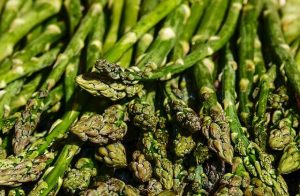Benefits of Asparagus–Asparagus is a healthy vegetable that is full of nutrients and vitamins. Here are more about the top 5 benefits of asparagus :

Top 5 Benefits of Asparagus,
Top 5 Benefits of Asparagus
Top 5 mistakes after knee replacement
Do you love asparagus? If so, you’ll be glad to know that this delicious vegetable has several benefits that make it a great choice for your diet. In this article, we’ll take a look at the top five benefits of asparagus and why you should consider adding it to your daily routine.
> Asparagus is a rich source of dietary fiber, which is beneficial for overall digestive health.
> Asparagus is a good source of vitamin A, which supports your vision and immune system.
> Asparagus is a good source of iron, which helps to maintain a healthy blood pressure and energy levels.
> Asparagus is a good source of vitamin C, which helps to keep your skin healthy and free from blemishes.
> Asparagus is a good source of potassium, which helps to regulate blood sugar levels and boost muscle function.
Why You Need To Eat More Asparagus
Asparagus contains potassium (K), an important nutrient for keeping your heart, bones, kidneys and nerves functioning and healthy. You may be shocked to know that this stalky vegetable also consists of a compound called asparaptine, which may help improve blood flow.
Top 5 Benefits of AsparagusTop 5 Benefits of AsparagusTop 5 Benefits of AsparagusTop 5 Benefits of AsparagusTop 5 Benefits of Asparagus
Nutrients but Few Calories
Asparagus is a vegetable that is high in nutrient content, but low in calories. Also, one cup of asparagus contains only 31 calories. Aside from being high in nutrients, asparagus is also low in fat and cholesterol, making it a healthy choice for those looking to watch their weight. Aspa.ragus is also a good source of fibre.
This Fibre helps to keep your digestive system healthy by absorbing bulky material like cholesterol and fat. Additionally, asparagus is a good source of vitamin C and potassium. These nutrients are essential for keeping your body functioning properly and helping you to fight against diseases.
Calories: 20
Protein: 2.2 grams
Fat: 0.2 grams
Fiber: 1.8 grams
Vitamin C: 12% of the RDI
Vitamin A: 18% of the RDI
Vitamin K: 57% of the RDI
Folate: 34% of the RDI
Potassium: 6% of the RDI
Phosphorous: 5% of the RDI
Vitamin E: 7% of the RDI
Source of Antioxidants
Aspa.ragus is a delicious vegetable that is high in antioxidants and other nutrients. It is a good source of vitamins A, C, and K, as well as vitamin B6, magnesium, and potassium. Asparagus also contains flavonoids, which are antioxidants that have anti-inflammatory properties.
These antioxidants help protect the cells from damage and may help reduce the risk of some diseases. Also, asparagus is a good source of fiber, which helps to keep you feeling full after eating it.
Eating asparagus with others fruits and vegetables can provide your body with a variety of antioxidants for good health.
Asp.aragus is a good source of antioxidants, including vitamins C and E, flavonoids and polyphenols. Antioxidants prevent the accumulation of harmful free radicals and can reduce your risk of chronic disease.
Improve Digestive Health
Asp.aragus is a great source of dietary fiber, which is essential for improving digestive health. It helps to regulate bowel movements and reduce the risk of constipation and diarrhea. In addition, asparagus is also a good source of vitamins A, C, and K, which are essential for the proper functioning of the body’s immune system.
Additionally, aspa.ragus contains significant amounts of potassium and vitamin B6, both of which are essential for maintaining a healthy blood pressure level.
Eating aspa.ragus as part of a fiber-rich diet is a great way to meet your fiber needs and help keep your digestive system healthy.
As a good source of fiber, asparagus improves regularity and digestive health and can help reduce your risk of heart disease, high blood pressure and diabetes.
Support a Healthy Pregnancy
Aspa.ragus is an excellent source of foliate, also known as vitamin B9.
Only half a mug of asparagus provides grown-ups with 34 of their diurnal foliate demand and pregnant women 22 of their diurnal demand.
Foliate is an essential nutrient that helps in the conformation of red blood cells and builds DNA for healthy growth and development. This is especially important in the early stages of gestation to insure the healthy development of the baby.

Top 5 Benefits of Asparagus,
Acceptable foliate deduced from sources similar as asparagus, green lush vegetables and fruits can cover against neural tube blights, including spine bifida.
Neural tube blights can lead to complications ranging from learning disabilities to lack of bowel and bladder control to physical disability.
In fact, acceptable foliate is so essential inure-pregnancy and early gestation that foliate supplements are recommended for women to meet their requirements.
Aspa.ragus is rich in foliate (vitamin B9), an important nutrient that helps reduce the threat of neural tube blights during gestation.

Top 5 Benefits of Asparagus,
Lower Blood Pressure
Asparagu s is a vegetable that is high in potassium, which is known to lower blood pressure. One cup of asparagus contains about 114 milligrams of potassium, which is more than a banana. Additionally, asparagus has long been used as a typical vegetable for hypertension and heart disease prevention.
It is also packed with other nutrients such as vitamins C and E, folic acid, and vitamin B6. All these nutrients work together to improve heart health and prevent hypertension.
Top 5 Benefits of AsparagusTop 5 Benefits of AsparagusTop 5 Benefits of AsparagusTop 5 Benefits of Asparagus
